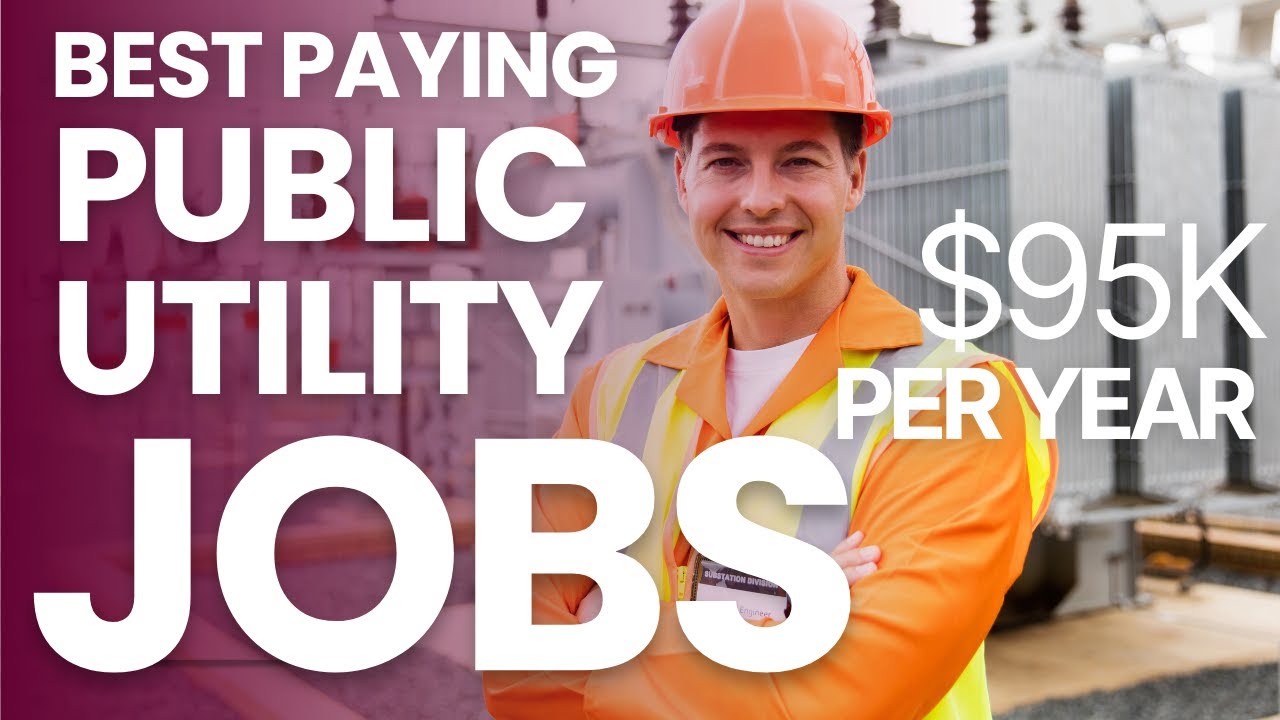Public utilities are essential services provided by the government or private companies to the general public. These services include electricity, water, gas, telecommunications, and transportation. In this article, we will explore what do public utilities jobs payand provide a general overview of salary ranges in different positions within the sector.
Working in the public utilities sector can offer stable employment opportunities with competitive salaries. The pay in public utility jobs can vary depending on various factors such as job position, qualifications, experience, and location. It is important to note that the following information serves as a guide, and specific salary figures may vary depending on individual circumstances and regional factors.
Best High Paying Utility Jobs

Best Paying Jobs in Public Utilities in 2024
When it comes to high-paying utility jobs, several positions stand out. These jobs often require specialized skills, advanced education, and significant experience. Here are five examples of high-paying utility jobs:
- Power Plant Manager -Power plant managers oversee the operations of power generation facilities. They are responsible for ensuring efficient production, maintenance, and safety protocols. With their crucial role, power plant managers can earn substantial salaries, typically ranging from $100,000 to $200,000 per year or more, depending on the size and complexity of the facility.
- Electrical Engineer -Electrical engineers in the utilities sector design, develop, and maintain electrical systems, equipment, and infrastructure. They work on projects such as power distribution networks, renewable energy systems, and grid optimization. The salaries for electrical engineers in the utility industry can range from $80,000 to $130,000 or higher, depending on their experience and expertise.
- Natural Gas Plant Manager -Natural gas plant managers oversee the operations of gas processing plants, ensuring the efficient extraction, purification, and distribution of natural gas. These positions require extensive knowledge of gas processing technology and safety procedures. Salaries for natural gas plant managers often range from $90,000 to $150,000 or more, depending on the size and complexity of the facility.
- Water Resources Engineer -Water resources engineers focus on the design and management of water supply, treatment, and distribution systems. They work on projects related to water infrastructure, wastewater management, and environmental protection. Salaries for water resources engineers in the utilities sector typically range from $70,000 to $120,000 or higher, depending on experience and project scope.
- Telecommunications Network Architect -Telecommunications network architects are responsible for designing and optimizing communication networks, including fiber optic, wireless, and broadband systems. They ensure the reliable and efficient transmission of data and voice communications. Salaries for telecommunications network architects can range from $80,000 to $150,000 or more, depending on the complexity and scale of the networks they work on.
What Is Public Utilities?
Public utilities refer to essential services provided to the general public by either government entities or private companies. These services are vital for society's functioning and include electricity, water supply, and treatment, natural gas distribution, telecommunications (such as phone and internet services), and transportation infrastructure (including roads, bridges, and public transit systems).
Public utilities are typically regulated to ensure fair and reliable service provision at reasonable rates. In many cases, they are considered natural monopolies due to the high costs associated with infrastructure development and maintenance. This means that in certain areas, only one utility company or government entity is authorized to provide a specific service, ensuring consistent service delivery and avoiding duplication of infrastructure.
Public utilities play a crucial role in supporting communities and businesses by providing essential resources and services. They ensure access to electricity for lighting, heating, and powering appliances, supply clean water for drinking and sanitation, enable communication through telephone and internet connections, distribute natural gas for heating and cooking, and facilitate transportation networks for commuting and logistics.
While some public utilities are owned and operated by government agencies, others may be privately owned, subject to regulatory oversight. In either case, the goal is to ensure the availability, reliability, and affordability of these essential services for the public's benefit.
Public utilities are often funded through a combination of customer fees, government subsidies, and investment in infrastructure development. Revenue generated from utility services is typically reinvested in maintenance, expansion, and improvement of the infrastructure to meet growing demand and technological advancements.
What Are Examples Of Utility Workers?
Utility workers are essential employees who work in various sectors of public utilities to ensure the reliable and efficient delivery of services to the public. Here are some examples of utility workers:
- Lineworkers -Lineworkers, also known as power line technicians or electricians, work in the electrical power industry. They are responsible for installing, maintaining, and repairing overhead and underground power lines. Lineworkers often work at heights and in various weather conditions to ensure uninterrupted electricity supply to homes, businesses, and public facilities.
- Water Treatment Plant Operators -Water treatment plant operators work in water utilities to ensure the safe and efficient treatment of water for drinking and other purposes. They operate and monitor the equipment and processes involved in purifying and disinfecting water, ensuring compliance with health and safety regulations.
- Gas Service Technicians -Gas service technicians work in natural gas utilities and are responsible for installing, inspecting, and maintaining gas distribution systems. They respond to gas leaks, conduct safety checks, and ensure the proper functioning of gas meters and appliances.
- Telecommunications Technicians - Telecommunications technicians, also known as telecom or network technicians, work in the telecommunications industry. They install, maintain, and repair telecommunications systems, including phone lines, internet connections, and data networks. These technicians may work for telephone companies, cable providers, or internet service providers.
- Wastewater Treatment Plant Operators -Wastewater treatment plant operators work in wastewater utilities and are responsible for the treatment and disposal of sewage and wastewater. They operate and monitor treatment processes, maintain equipment, and ensure compliance with environmental regulations.
- Meter Readers -Meter readers are responsible for recording utility usages, such as electricity, gas, or water, by manually reading meters at residential and commercial properties. They ensure accurate billing and monitor consumption patterns.
- Customer ServiceRepresentatives -Customer service representatives work in utility companies to assist customers with inquiries, billing issues, service requests, and account management. They provide information about utility services, handle complaints, and help customers troubleshoot problems.
These are just a few examples of utility workers in different sectors. Utility companies often employ a diverse range of professionals, including engineers, system operators, environmental specialists, and administrative staff, to support the efficient functioning of public utilities and ensure the delivery of essential services to the public.
What Do Public Utilities Jobs Pay?

What do Public Utilities Jobs Pay - www.craiglistbox.com
Salaries in public utility jobs can vary depending on several factors, including job position, qualifications, experience, and location. Here is a general overview of salary ranges for some common public utilities jobs:
- Entry-Level Positions -Entry-level positions in public utilities, such as customer service representatives or meter readers, typically have salary ranges starting from $25,000 to $45,000 per year, depending on the location and company size.
- Technicians- Technicians in public utilities, such as electricians, water treatment operators, or gas service technicians, can earn salaries ranging from $35,000 to $60,000 per year, depending on their experience and specific skills.
- Engineers -Engineers working in public utilities, such as electrical engineers, civil engineers, or environmental engineers, often earn higher salaries. Their salaries can range from $60,000 to $100,000 or more per year, depending on their level of expertise, experience, and specialized knowledge.
- Management and Supervisory Positions -Managers and supervisors in public utilities typically earn higher salaries due to their increased responsibilities. These positions can have salary ranges starting from $70,000 per year and potentially exceeding $150,000 per year, depending on the scope of their role, the size of the organization, and their level of experience.
It's important to note that these salary ranges are approximate and can vary significantly based on the specific job, geographic location, industry demand, company size, and an individual's qualifications and experience. Additionally, public utility jobs may offer additional benefits such as retirement plans, healthcare coverage, and paid time off, which can contribute to the overall compensation package.
Factors Affecting Salaries Of Public Utilities Positions
The salaries of public utilities positions are influenced by several factors. These factors can vary depending on the specific job, location, industry demand, and the individual's qualifications and experience. Here are some key factors that affect salaries in public utility positions:
- Job Position and Responsibility -The level of responsibility and the complexity of the job position play a significant role in determining salaries. Higher-level positions, such as managerial or specialized technical roles, often come with greater responsibilities and require advanced skills and expertise, which can result in higher salaries.
- Qualifications and Experience -Educational qualifications and professional experience strongly influence salaries in public utility positions. Individuals with higher levels of education, such as bachelor's or master's degrees, or specialized certifications in relevant fields, may be eligible for higher pay scales. Additionally, those with extensive experience and a proven track record in their field may command higher salaries.
- Geographic Location -Salaries can vary based on the geographic location of the job. Factors such as the cost of living, local economy, and demand for specific skills in a particular area can impact salary levels. Salaries in major metropolitan areas or regions with high living costs are generally higher compared to rural or less populated areas.
- Industry Demand and Market Conditions -The demand for specific skills and expertise in the public utilities industry can influence salaries. Positions that require specialized knowledge, such as renewable energy, smart grid technologies, or water resource management, may command higher salaries due to the demand for those skills. Additionally, market conditions and industry trends can affect salary levels, with certain sectors experiencing higher growth and increased competition for talent.
- Union Membership -In some cases, public utility positions may be unionized. Union membership can influence salary structures, ensuring fair compensation based on collective bargaining agreements and industry standards. Unionized positions may offer more standardized salary ranges and benefits.
- Size and Type of Organization -The size and type of the organization also impact salaries. Larger utility companies or government entities may have more resources to offer competitive salaries. Additionally, private companies in the utilities sector may have different compensation structures compared to government-operated utilities.
It's important to note that these factors interact with each other, and their relative importance may vary depending on the specific circumstances. Additionally, salary ranges can change over time due to economic factors, market conditions, and industry trends. Conducting research, consulting job listings, and considering local market conditions can provide more accurate and up-to-date information on salaries in public utility positions.
Public Utilities Job Salaries In The Futures
Predicting the exact salaries of public utility jobs in the future is challenging due to the various factors that can influence compensation. However, there are some trends and considerations that may shape salary expectations in the future:
- Technological Advancements -The public utilities sector is undergoing rapid technological advancements, including the integration of renewable energy sources, smart grid technologies, and digital infrastructure. As these technologies continue to evolve, there may be an increased demand for professionals with specialized skills and knowledge, which could lead to higher salaries for positions in these emerging fields.
- Sustainability and Environmental Concerns -With a growing focus on sustainability and environmental protection, there is a need for professionals who can drive initiatives related to energy efficiency, water conservation, and eco-friendly practices in public utilities. As the importance of these areas increases, it is possible that salaries for positions related to sustainability and environmental management within public utilities may see positive growth.
- Workforce Demographics and Retirement -The public utilities sector, like many other industries, is experiencing an aging workforce. As experienced professionals retire, there will be opportunities for new talent to step into higher-level positions, potentially leading to salary growth as companies compete to attract and retain skilled workers.
- Investment in Infrastructure -Government investments in infrastructure development and improvement projects can have a positive impact on the public utilities sector. Increased funding for utilities may result in higher demand for professionals across various positions, potentially leading to salary growth.
- Economic Factors -Economic conditions, such as inflation rates, overall economic growth, and government policies, can influence salary trends across industries, including public utilities. It is essential to consider broader economic factors when forecasting salary expectations for the future.
People Also Ask
What Are Public Utilities Jobs?
Public utility jobs refer to employment opportunities in sectors that provide essential services to the general public. These services include electricity, water, gas, telecommunications, and transportation.
What Qualifications Are Required For Public Utility Jobs?
The qualifications required for public utility jobs can vary depending on the specific position. Generally, a high school diploma or equivalent is the minimum requirement for entry-level roles. However, technical and specialized positions often require relevant certifications, associate degrees, or bachelor's degrees in fields such as engineering, environmental science, or businessadministration.
How Can I Find Public Utilities Job Openings?
To find public utilities job openings, you can utilize various resources. Start by exploring job search websites and online job boardsthat cater to utility companies or government agencies. Additionally, consider visiting the careersections of specific utility company websites or contacting their human resources departments directly. Networking, attending job fairs, and reaching out to professional associations in the utility sector can also provide valuable job leads.
Conclusion
Public utility jobs offer competitive salaries and stable employment opportunities. The actual pay in these jobs depends on factors such as job position, qualifications, experience, and location. By considering these factors, individuals can better understand the potential earning prospects within the public utilities sector and make informed career decisions.
It's important to conduct further research and consult job listings and industry resources for the most up-to-date and accurate salary information in specific positions and locations.

